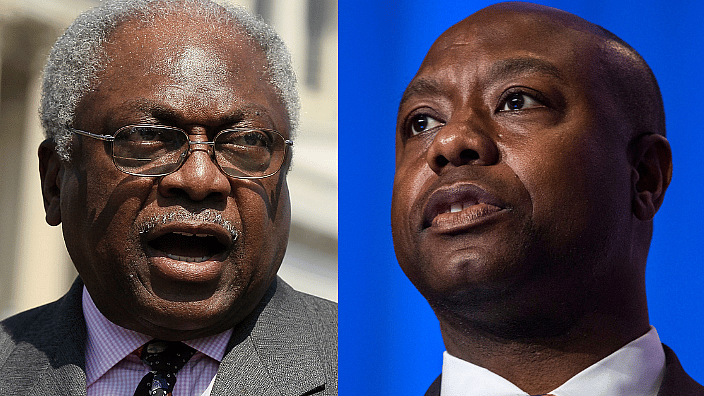House Majority Whip James Clyburn is stepping in and calling his fellow South Carolinian, Republican Senator Tim Scott, to keep the negotiations alive as sources tell theGrio that the George Floyd Justice in Policing Act is collapsing.
Meanwhile, Senator Lindsey Graham, also of South Carolina, has been having weekly conversations with George Floyd family attorney Ben Crump to make sure the proposed legislation will be meaningful to the Floyd family and other families of loved ones killed by the hands of police. Sen. Scott has also made calls to Mr. Crump.
The Floyd family has said repeatedly that this legislation has George Floyd’s blood on it and therefore has to be meaningful.

The nation is on standby for Senator Scott’s formal plan on police reform that is expected sometime this week after the lawmaker missed Wednesday’s original deadline. It remains unclear when Scott’s version of the George Floyd Justice in Policing Act will be released, however, the police reform framework is said to be in place.
Scott had been negotiating with Democrats U.S. Rep. Karen Bass of California and Senator Cory Booker of New Jersey in what had been called in the past good faith negotiations. Their negotiations, however, have stalled, causing Congressman Clyburn to reportedly step in.
Following theGrio‘s reporting on his involvement in negotiations, Whip Clyburn told theGrio late Wednesday that he is doing everything he can to “help the negotiators get to a good place.” What’s more, Minnesota Attorney General Keith Ellison, who served as special prosecutor in the case against former Minneapolis police officer Derek Chauvin for the murder of George Floyd, told theGrio he supports Clyburn’s efforts at playing broker between Democrats and Republicans.
“If anybody can pull it off it’s him,” Ellison said.
The main source of the delay comes from attempts to get buy-in from policing organizations that are not in support of the accountability and transparency aspects of reforming or eliminating qualified immunity for law enforcement. Organizations like the National Organization of Black Law Enforcement Executives and the National Sheriffs’ Association are against the financial costs of lawsuits that could be laid against officers and police departments if qualified immunity is no longer in effect. Their concern is that departments could bankrupt as a result.
There are also reports of soft lobbying by the organizations to congressional leaders to sway them to support police immunity.
White House Press Secretary Jen Psaki said during Wednesday’s press briefing there are “ongoing discussions between Democrats and Republicans.” She added, “Police reform is long overdue and they will not get ahead of the negotiations.”

Negotiations have been called a “mess” and “in total disarray” as sources close to the process contend mainstream “police organizations won’t agree to anything.”
“There are difficult components of this discussion. A lot of those are happening in private which is the place where they should move forward,” Psaki explained.
Congressman Andre Carson (D-Ind.) is on several sides of the spectrum as a former police officer and as a Black man who at the age of 17 was profiled on the basis of race and religion when he was arrested outside of a mosque in Indianapolis in 1991. Carson was jailed during the incident as the then young civilian was mistaken as an older man due to his height.

“Qualified immunity was established to protect officers,” Carson told theGrio, adding “we have seen so much access and abuse by law enforcement. We have seen the public influence of white supremacists and white nationalist sympathizers and empathizers.
“In police agencies and sheriff departments across our country … many of these actors are killing men and women without retribution, without justice [and] a level of accountability.”
Over 90% of cases in which Black people are shot by police end in the officer involved getting the case dismissed due to qualified immunity, said attorney Ben Crump.
Have you subscribed to theGrio’s “Dear Culture” podcast? Download our newest episodes now!
TheGrio is now on Apple TV, Amazon Fire and Roku. Download theGrio.com today!


